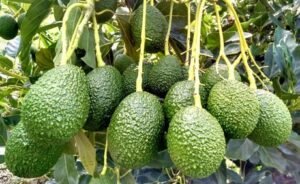By Murimi Gitari, February 16, 2023, The World Bank has approved a $250 million International Development Association (IDA*) credit for a new National Agricultural Value Chain Development Project (NAVCDP) that will increase market participation and value addition for 500,000 small scale farmers in Kenya who are engaged in nine value chains across 26 counties.
The NAVCDP will build on the foundation set by two existing World Bank funded projects namely, the National Agricultural and Rural Inclusive Growth Project and the Kenya Climate Smart Agriculture Project, and will mostly focus on a subset of farmers drawn from these two projects who are engaged in dairy, poultry, fruits (banana, mango, and avocado), vegetables (tomato & potato), coffee, cotton, cashew nut, apiculture, and pyrethrum value chains.
World Bank Country Director for Kenya, Keith Hansen noted that the project will unlock new opportunities for maximizing finance and private sector investments in the nine value chains through a range of value chain investments and other enabling initiatives such as improved subsidy targeting through e-vouchers and operationalizing warehouse receipt financing.
“It will engage intensively with private sector value chain actors to crowd in investments in agri-business opportunities such as input supply, access to finance for farmers and small and medium enterprises (SME’s), digital extension services, farm gate infrastructure development and maintenance, storage and cold chains, insurance schemes and consumer retail.” He explained.
The project will deepen investments in existing interventions around productivity enhancement, community led farmer extension, water management and data driven value chain services. It will alsointroduce intensified investments into select value chains, scale up value addition and market linkages with agribusiness off-takers and small and medium enterprises, support farmer-led irrigation development (FLID), enhance access to credit, and support the rollout of urban food system pilots in select clusters.
The FLID activities will focus on developing water efficient irrigation systems, water harvesting and efficient water use, building drought adaptive capacity and climate resilience, while pilots of urban food systems based on climate-smart and safe agriculture principles will be rolled out in Nairobi and surrounding counties.
Vinay Vutukuru, the World Bank Senior Agriculture Economist said that the implementation of the digital agriculture initiatives, farmer led irrigation development initiative, and the safer urban food systems initiative are innovative and will provide insights for future World Bank initiatives in these areas.
“Under the urban food system pilot, climate smart agriculture technologies will be promoted and scaled up for urban and peri-urban farmers, and market linkages between rural producers and urban consumers will be strengthened.” He added
The project will also benefit other value chain actors at various levels such as extension workers, aggregators, logistics support providers and SMEs operating within the value chain.
The selection of value chains and counties was driven by a multi-dimensional criterion. The 26 counties include Kilifi, Taita Taveta, Kwale, Tana River, Kakamega, Busia, Kisii, Migori, Homa Bay, Nakuru, Narok, Bomet, Kericho, Nyandarua, Trans-Nzoia, Nandi, Uasin Gishu, Machakos, Makueni, Kitui, Meru, Murang’a, Kiambu, Kirinyaga, Embu and Nyeri.







